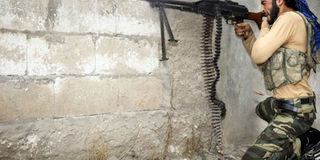Kenya not backing UN move for ICC action on Syria

A rebel fighter fires his machine-gun at Syrian government troops at the citadel in the town of Harem, on the Turkish border, on October 31, 2012. Kenya is not among the 58 countries that on Monday urged the United Nations Security Council to initiate an International Criminal Court investigation of atrocities committed by all sides in Syria. AFP PHOTO/JOHN CANTLIE
What you need to know:
- Five African nations — Botswana, Cape Verde, Côte d’Ivoire, Ghana and Seychelles — did sign the letter that Switzerland had circulated to all 193 UN member-states.
- Kenyan UN Ambassador Macharia Kamau said on Tuesday that he was not aware of the ICC-Syria letter.
Kenya is not among the 58 countries that on Monday urged the United Nations Security Council to initiate an International Criminal Court investigation of atrocities committed by all sides in Syria.
Most other African states, including several that are parties to the ICC treaty, joined Kenya in declining to sign a letter in support of a French-sponsored Security Council resolution expected to be put to a vote on Thursday.
Five African nations — Botswana, Cape Verde, Côte d’Ivoire, Ghana and Seychelles — did sign the letter that Switzerland had circulated to all 193 UN member-states.
Nigeria, currently a member of the Security Council, has also expressed support for an ICC role in Syria.
NOT AWARE
Kenyan UN Ambassador Macharia Kamau said on Tuesday that he was not aware of the ICC-Syria letter.
The envoy noted he is currently in Kenya, not at the country's UN mission in New York.
It is “certainly disappointing” that a large majority of African signers of the ICC treaty have not endorsed this call for court intervention, said Richard Dicker, director of the international justice programme at Human Rights Watch.
Tanzania, Uganda and South Africa, along with Kenya, are among the 34 African countries that are parties to the ICC treaty.
“This raises questions regarding those states' commitment to fight against impunity generally,” Mr Dicker added.
“Some African leaders have said they are dissatisfied with the court because it seems to go after only Africans, so here's an opportunity for the court to take action outside of Africa,” he said. “What's the problem?”
It may be, Mr Dicker noted, that some state parties to the ICC treaty object to provisions in the French resolution that have been inserted at the insistence of the United States, which is not a party to the ICC but which is supporting ICC action on Syria.
The controversial provisions are designed to distance the US from the court's jurisdiction — a stance on Washington's part that “crystallises a double standard of justice,” Mr Dicker remarked.
He paraphrased the US position on the ICC's ability to investigate atrocities in nations around the world as “it's good for them, inappropriate for us.”
But declining to support an ICC investigation in Syria due to objectionable parts of the French proposal “makes the perfect the enemy of the good,” Mr Dicker said.
He suggested that countries could articulate their opposition to specific provisions of the resolution while endorsing its overall aim.
A majority of the Security Council's 15 members have indicated they will vote in favour of referring the Syrian situation to the ICC.
But the resolution faces a veto by at least one of the council's five permanent members, each of which has the power to block council action.
Russia has said it will veto the initiative.
China, which has joined Russia in blocking three earlier resolutions pertaining to Syria, could join Russia on Thursday in vetoing the latest move at the UN opposed by allies of Syria's government.
Some diplomats suggest that China's anticipated position could also be influencing African countries' reluctance to back ICC action on Syria.
Sizable Chinese investments in Africa are enhancing Beijing's political power on the continent — to the point, some say, where it now rivals Washington's.




